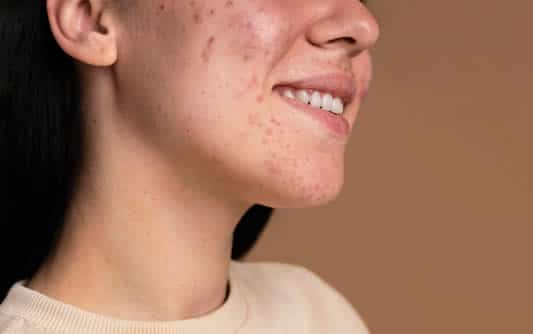The most severe type of acne is called cystic acne, in which deep and very inflamed acne develops on the face or other parts of the body. The breakouts may be large and can leave unsightly scars. These acne bumps or cysts appear under the surface of the skin and are filled with fluid and often painful.
What causes it?
All types of acne are primarily caused by too many dead skin cells in the pores, overactive oil glands, or a proliferation of acne-causing bacteria. Minor acne blemishes develop when a pore wall breaks near the skin’s surface and leaks infected material into the surrounding area. If a pore wall similarly breaks deeper under the skin’s surface, more severe blemishes can form. If the infected material leaks into adjacent pores, cysts may develop. This most severe kind of acne is usually not related to things like poor cleansing or making poor diet choices. Some people are just more prone to cystic acne than others. It has also been shown to have a genetic element, with parents who had cystic acne more likely to pass severe acne down to their children.
Can it cause scarring?
Because cystic acne damages healthy tissue, it is very common for scars to form in the skin. The best way to limit scarring is to stay on top of treating this type of acne. It is also important to avoid popping or picking at acne cysts, which will likely worsen the breakout and lead to skin damage and scarring. Many patients with this form of severe acne struggle with the embarrassing appearance of breakouts and the lingering effects of scars. This is another reason to get professional treatment from a skilled dermatologist like Dr. Bernard Raskin in Bakersfield.
How is cystic acne treated?
Strong medications are almost always required to adequately treat cystic acne, so seeing a professional is a vital element of treatment. Systemic medications that circulate throughout the body instead of just focusing on one part are a common choice for handling cystic acne. Some of the most frequently prescribed treatments include:
- Oral antibiotics
- Oral contraceptives for women
- Corticosteroid injections
- Accutane
- Surgical skin incision to access and drain the cyst
In can be difficult to gain control of cystic acne, so patients should remember to be persistent and follow the physician’s instructions carefully. Several treatment combinations may be necessary to find the right method for each individual patient. Working closely with your experienced dermatologist is the best way to successfully treat cystic acne.
Schedule an appointment today in our Bakersfield dermatology office.

